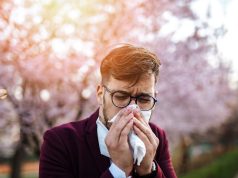No significant difference from placebo in patients with moderate-to-severe seasonal allergic rhinitis
TUESDAY, Feb. 14, 2017 (HealthDay News) — Sublingual grass pollen immunotherapy is not associated with improved nasal response to allergen challenge versus placebo at three-year follow-up in adults with moderate-to-severe seasonal allergic rhinitis, according to a study published in the Feb. 14 issue of the Journal of the American Medical Association.
Guy W. Scadding, M.B., B.S., Ph.D., from Imperial College London, and colleagues conducted a randomized placebo-controlled trial involving adult patients with moderate-to-severe seasonal allergic rhinitis who were randomized to receive two years of sublingual immunotherapy, subcutaneous immunotherapy (included as a positive control), and matched double-placebo (36, 36, and 34 patients, respectively). Nasal allergy challenge was performed before treatment, and annually for three years (at one and two years of treatment and one year after treatment discontinuation).
The researchers found that the mean total nasal symptom score was 6.36 at pretreatment and 4.73 at three years for the sublingual immunotherapy group, compared with 6.06 pretreatment and 4.81 at three years for the placebo group. After adjustment for baseline, the between-group difference was −0.18 (95 percent confidence interval, −1.25 to 0.90; P = 0.75).
“Two years of sublingual grass pollen immunotherapy was not significantly different from placebo in improving the nasal response to allergen challenge at three-year follow-up,” the authors write.
Several authors disclosed financial ties to pharmaceutical companies, including ALK, which supplied the allergy vaccines, matching placebos, and allergen extracts for skin testing and nasal allergen provocation.
Full Text (subscription or payment may be required)
Editorial (subscription or payment may be required)
Copyright © 2017 HealthDay. All rights reserved.








